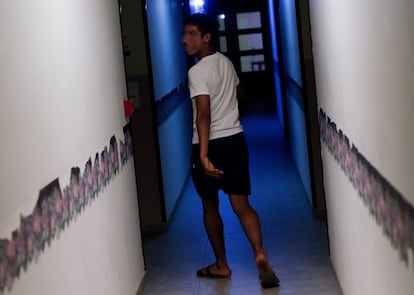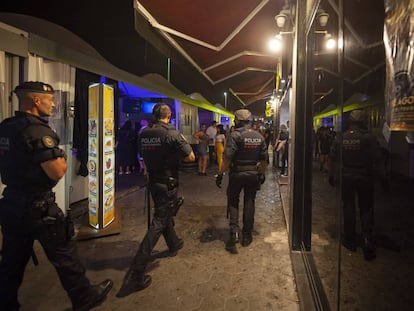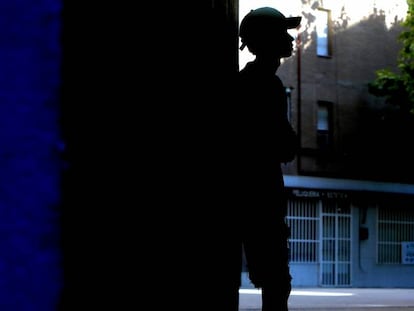How the term “mena” hurts unaccompanied migrant minors in Spain
The word has been used negatively during the election campaign to criminalize youngsters who, according to the Spanish ombudsman, are “the most vulnerable of the vulnerable”

The term “mena,” an acronym for menor extranjero no acompañado or unaccompanied foreign minor, is being increasingly used in public speeches and political rhetoric in Spain.
This has been particularly notable during the recent election campaign. The word is often used negatively by far-right parties such as Vox, which want to portray these minors as foreign delinquents who should go back to their countries of origin.
There is no such thing as illegal people. Their actions, if anything, can be illegal
Francisco Javier García Castaño, Granada University
Experts in immigration and children’s issues say that using this word hides the fact that these are children and teenagers who have arrived in Spain without their families, and who are living in vulnerable conditions.
Several politicians and associations have already criticized the use of the word “mena” instead of simply “minor.” Teresa Rodríguez, secretary general of the anti-austerity party Podemos in Andalusia, said on Twitter that the use of the word dehumanizes children and teens.
Les llaman "MENAS" porque quieren que nos olvidemos de que son NIÑOS Y NIÑAS que están SOLOS.
— Teresa Rodríguez ۞ (@TeresaRodr_) November 5, 2019
No caigamos en su juego. No dejemos que los deshumanicen. pic.twitter.com/WBODmk0OuV
“They call them MENAS because they want us to forget that they are BOYS and GIRLS who are ALONE. Let's not fall in their game. Let's not let them be dehumanized.”
The United Nation’s children’s agency UNICEF also launched a campaign a few days before the elections, noting that the majority of migrant children “have committed no crimes.” And the NGO Save the Children has criticized “the rhetoric of hate and the criminalization of migrant children,” urging authorities to guarantee their safety, especially after cases of attacks against unaccompanied minors in Madrid and Zaragoza.
Although the term was originally neutral and used for years in legislation and immigration studies, “when it reaches the wider public and only the acronym is used, we are categorizing [the minors] in such a way as to seem to be talking about something other than children,” says Carmela del Moral, head of children’s policies at Save the Children.
The anthropologist Francisco Javier García Castaño, director of the Migration Institute at Granada University, compares it to the use of “illegal” to describe undocumented migrants. “There is no such thing as illegal people. Their actions, if anything, can be illegal.”
An analysis of Google searches shows that until this year, there was barely any online discussion about these unaccompanied minors, and that there was a peak in the summer coinciding with a surge in Barcelona street crime that was attributed to some of these minors. There was another peak during the election campaign in early November.
In figures
According to Interior Ministry figures, in July 2019 Spain had taken charge of 12,262 minors. This is more than in December 2017 (6,414), but slightly fewer than in 2018.
According to a Catalan government report on the nearly 3,000 unaccompanied migrant minors living in the region, in March 2019, 91% had no record of police or court proceedings against them.
Most of these minors come from Morocco and Algeria, and the majority are teenage boys.
Before the November 10 election, the acting ombudsman, Francisco Fernández Marugán, issued a statement that did not mention any political party specifically, but criticized the policy of criminalizing a community that he described as “the most vulnerable of the vulnerable.”
Rocío Monasterio, the speaker of the far-right Vox party in the Madrid regional assembly, went twice to migrant minor centers before the election, and described its occupants as “packs of menas.” One center in the Hortaleza district of Madrid suffered an attempted break-in by a group fo 30 people armed with sticks, stones and bottles. There was a similar incident in Castelldefels, in Barcelona.
Edelia Villarroya, a psychologist and director of a master’s degree in migration studies at Valencia University, says that using the term helps portray these minors as a threat, and makes it easier to appeal to emotions such as fear and insecurity. “The problem posed by these minors, from a statistical viewpoint, is insignificant. The weakest link is being used as a scapegoat,” she says.
The debate over the use of the term predates the election. In July, the Interior Ministry said it was considering using a different word. The term NNAMNA was suggested (Niños, Niñas y Adolescentes Migrantes No Acompañados, or Unaccompanied Migrant Boys, Girls and Teenagers.)
Villarroya feels that a name change will not be much use, while García Castaño and Del Moral think it might help.
English version by Susana Urra.
Tu suscripción se está usando en otro dispositivo
¿Quieres añadir otro usuario a tu suscripción?
Si continúas leyendo en este dispositivo, no se podrá leer en el otro.
FlechaTu suscripción se está usando en otro dispositivo y solo puedes acceder a EL PAÍS desde un dispositivo a la vez.
Si quieres compartir tu cuenta, cambia tu suscripción a la modalidad Premium, así podrás añadir otro usuario. Cada uno accederá con su propia cuenta de email, lo que os permitirá personalizar vuestra experiencia en EL PAÍS.
¿Tienes una suscripción de empresa? Accede aquí para contratar más cuentas.
En el caso de no saber quién está usando tu cuenta, te recomendamos cambiar tu contraseña aquí.
Si decides continuar compartiendo tu cuenta, este mensaje se mostrará en tu dispositivo y en el de la otra persona que está usando tu cuenta de forma indefinida, afectando a tu experiencia de lectura. Puedes consultar aquí los términos y condiciones de la suscripción digital.
More information
Archived In
Últimas noticias
Maduro pleads not guilty before the federal court in New York: ‘I am still the president of Venezuela’
A new test can detect Alzheimer’s from a finger prick
UN team enters Sudanese city of El Fasher after paramilitary massacre: ‘It’s like a ghost town’
A recipe for resistance: Indigenous peoples politicize their struggles from the kitchen
Most viewed
- Gilles Lipovetsky: ‘If you want to live better and fall in love, take Prozac, don’t look to philosophy’
- Alain Aspect, Nobel laureate in physics: ‘Einstein was so smart that he would have had to recognize quantum entanglement’
- Alvin Hellerstein, a 92-year-old judge appointed by Bill Clinton, to preside over Maduro’s trial in New York
- Why oil has been at the center of Venezuela-US conflicts for decades
- Maduro’s downfall puts China’s relationship with Venezuela to the test











































